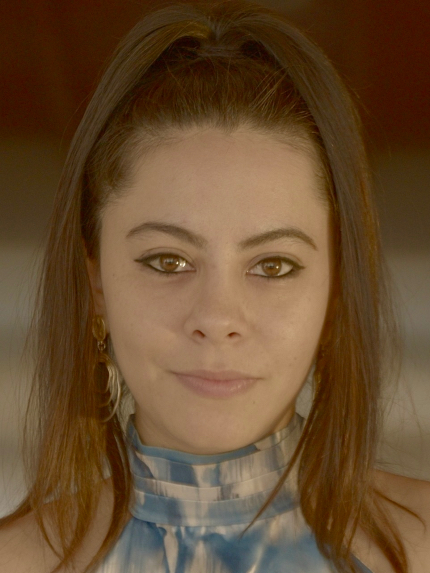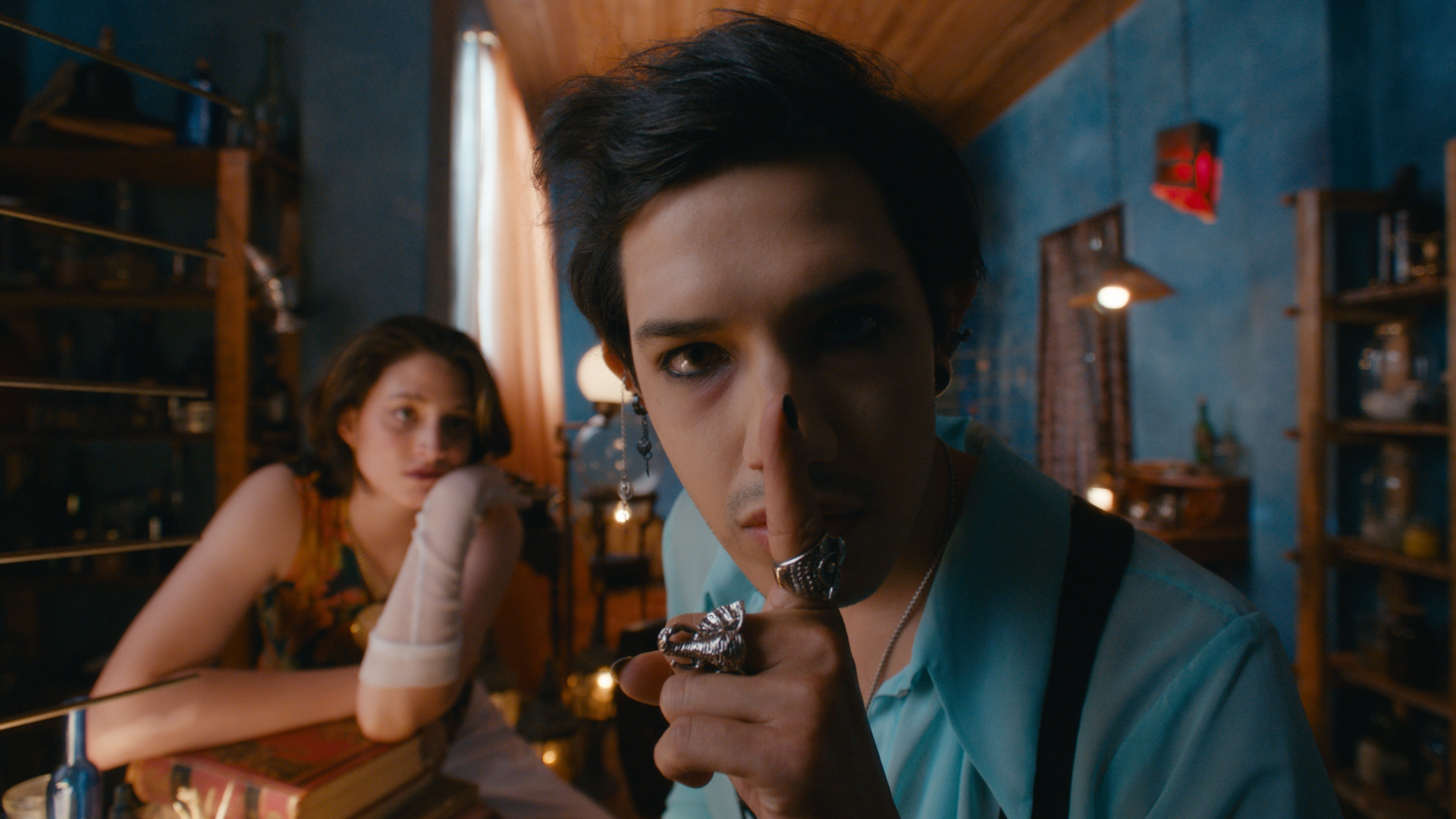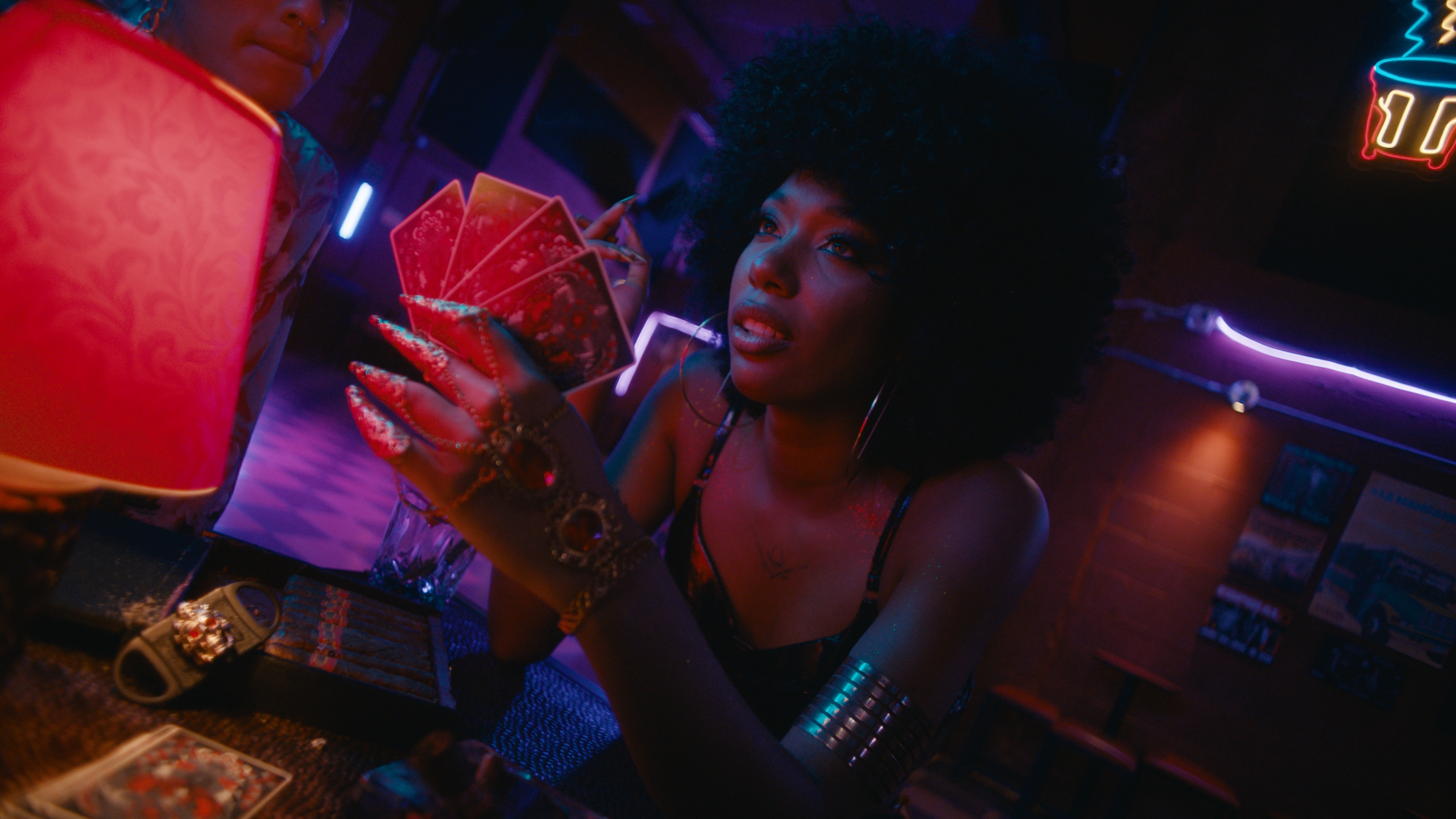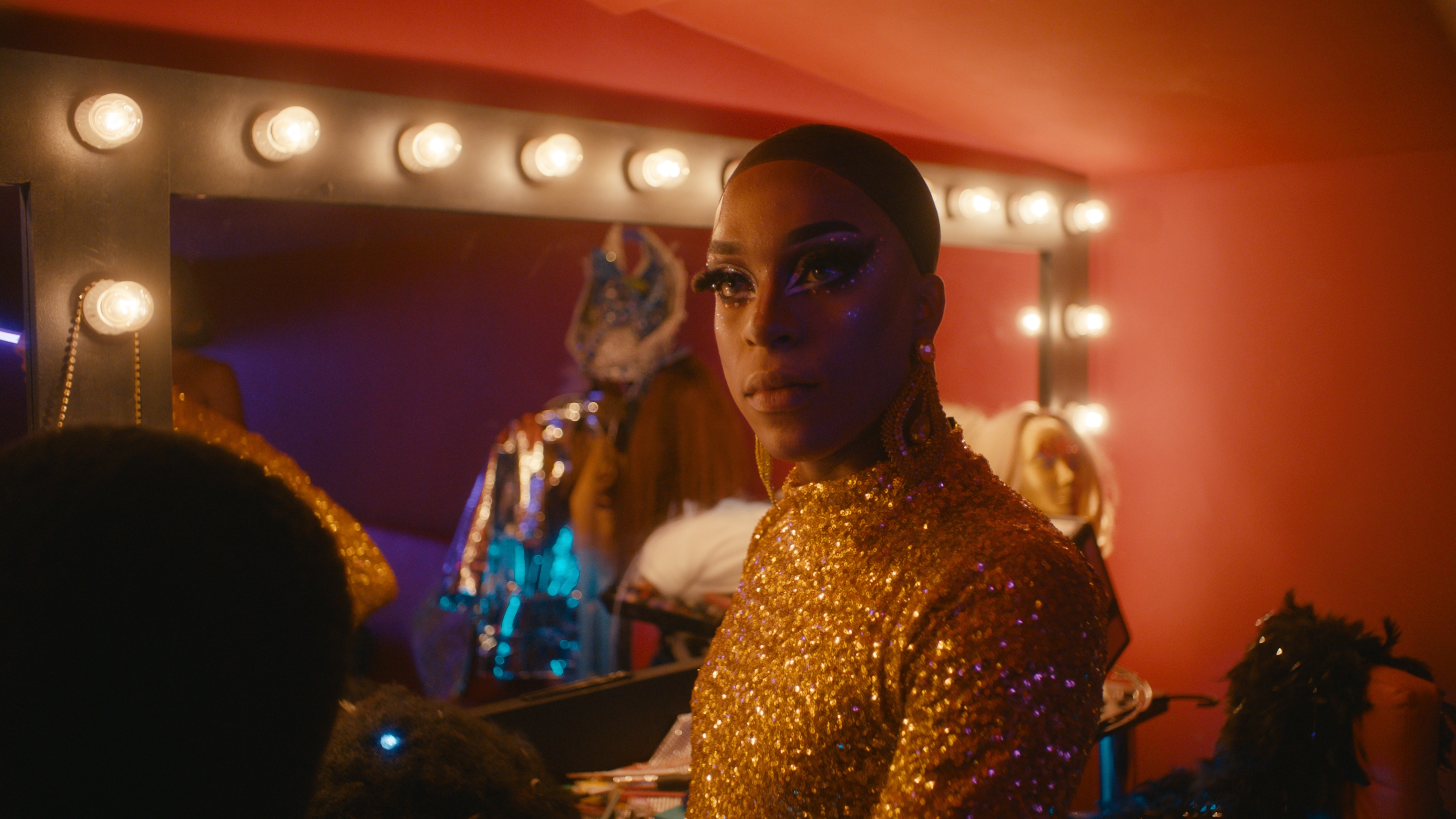Rotterdam 2025 Interview: RAINS OVER BABEL Director Gala del Sol Talks Mythic Worldbuilding, Queer Programming, Personal Healing

It's always exciting when a film invites you in.
Boticario is the bartender of Babel, a purgatorial dive bar for the damned and the desperate. An eclectic array of characters cross paths here, and each is on their own mission. Dante's job is to see folks through to the next life, but not all souls are willing to come quietly. The local pastor is troubled by the proclivities of the colourful characters about the place, but there's a history behind his touchiness.
Jacob has been rehearsing with a drag dance troupe, but his father's queerphobia leaves him with doubts. Amidst all this mayhem, troubled mother Uma is locked in a game with Babel's mysterious puppetmaster, La Flaca. If she plays her cards right, she might get her life back.
With its intoxicating neon lighting and denizens so fashionable that they simply must be hiding their true occupations, Babel is transportive -- like a graphic novel with rich worldbuilding (Vertigo's Fables comes to mind) -- otherworldly in the way that a queer space often is, manifesting as its own separate bubble, with unique rules, expectations, and surprises.
Rains Over Babel is the kind of cinematic cocktail that demands to be seen with a crowd, and the film has greeted some major audiences already, premiering at Sundance Film Festival in January and making its European introduction at IFFR in February. Debut director Gala del Sol's film is, above all, about collective -- in its making, in its fiction, and in the audiences that it will inspire.
Screen Anarchy: You spoke in the Q&A at IFFR about this having been a highly collaborative process between yourself and your cast. How did the concept of the film originate?
Gala del Sol: Initially, this was not meant to be a film. It started off as a workshop with a group of very talented young theatre actors who wanted to get into film. I was raised in theatre, and I love working with theatre actors. They're so lively and communicative. You have to wrangle them down a little bit, because they're overflowing with ideas. We began meeting online during the pandemic, a couple of times a week. I asked each of them to create a character that they've always wanted to play, that will help heal something from their lives.
I combined those characters with this imagined world that I have. It's a city of another dimension -- I say that it's 'retro-futuristic tropical punk'. I love magical realism. I thought it was an interesting mix, these very raw, real characters within this mythical world -- where you have death personified as La Flaca, where the bartender is also the devil, where you have a guardian angel overlooking people.
It wasn't until six months in to this process that I became inspired to write the film. It was through a series of improvisation exercises that I began to see that there were some common themes between the characters. It took me four months to write a full script. I locked myself in my apartment to write it. Then I brought it to the actors to flesh the characters out. I put the bones, and they put the flesh. Then we added the hair and the nails together.
I got to work with my actors for almost two years before we began shooting the film. By the time we shot, their characters had almost become a second skin to them. So we could focus -- not on "oh, the character wouldn't speak like that", but instead on the little details that could make the performances great.
The characters in this film live on the outskirts of the city -- they're misfits. I wanted to explore these kinds of characters, the ones that we don't usually see in Latin American films -- queer African-Colombian people, for example. It's interesting, because the film ended up a natural reflection of what this group of twenty-year-olds was going through during the pandemic, the things that were affecting us. For me, it was my first time dealing with death and illness. That's why the character that crosses all of the narrative lines is La Flaca.
You've created a rich world, and you've taken one little slice out of it. Was there a temptation to go wider? And do you have further plans for this universe beyond this film?
I feel that it's kind of like a Marvel universe. I wish I had more time in the film to explore more characters. What I'm doing now is writing several stories that live within that same world. In future projects, we'll perhaps see characters that we've seen before -- but not necessarily. Take the Tim Burton universe,for example, where you have many different kinds of stories, but you get the feeling that all of them live within the same world. That's a little bit of what I would love to do in the future.
Was there a concern when working with these theatre actors with such a big flood of ideas that trying to marry all these disparate parts was going to get a bit difficult? How did you keep it cohesive?
A lot of the time, but it's a good thing. It's better to have more ideas than less ideas. The good thing is that if you have many ideas, you can choose. It's a matter of decanting.
It was challenging, because I didn't want to break any hearts. Not all the actors we started working with ended up in the film. And even now, when I watch it, I'm like: "We could have done with one less storyline". And, of course, my story isn't perfect -- it was my first feature. But I think that I did the best that I could, the best that I had.
Was the initial cut longer than two hours?
It was around three hours. I cut down a bunch of scenes. There was a point when I thought it was finished, and it was two hours and five minutes. Six months later, I was like: "I have to cut fifteen minutes out of this". So we recut it six months after we thought it was done.
What order were the scenes shot in? One thing that I really like about the film is that it feels like you find your voice as a filmmaker as the film progresses, much like your characters find their voices as it progresses. The second half of the film enters into this confident groove that perhaps we're still in the process of finding during the first half.
Actually, we shot the motel sequences [from the second half of the film] first. That was the first week and a half of shooting. Then, the next three weeks, we shot the nightclub scenes. Babel is actually two nightclubs in real life. We rented a dilapidated 1920s, Art Deco-style building. It was empty, so we built a set on every floor.
You've spoken about how your actors healed something in themselves through their characters. I'm curious as to what you healed for yourself through making the film. What did you find through the project?
The pandemic was the first time that I had to deal with death and illness of loved ones. For me, this was a reconciliation with the idea of death -- to stop fearing it and just start thinking about it as a form of passage, as a transition. I shouldn't have favourites, but my favourite character is La Flaca. She has this very powerful, sometimes scary personality. But by the end of the film, you realise she's just doing her job.
I'm curious about the queer elements in the film and whether or not you want this film to be perceived as 'queer cinema' or a 'midnight movie' or both.
It's interesting. Because it could be considered queer cinema -- two of the four narrative lines are queer. It is and it isn't. It's a natural reflection of what this group of people was going through at that time, and I think it ultimately depends on who's watching. A lot of LGBTQ festivals don't consider it queer enough to be in their festival.
I've noted the film's absence from some festival lineups that I might have expected to see it in.
Apparently, for general festivals, it's too queer, and for queer festivals, it's not queer enough. We're stuck in-between. It's a weird thing. But I'm taking it one day at a time. I'm so grateful for the festivals that we do get into. I think that the goal of any director is to get their film seen, and to get it appreciated by the right audiences. We're very lucky and grateful for the audiences that we had at Sundance and at Rotterdam. I had a lot of people come up to me after the screenings, crying sometimes, telling me a little bit of their life story and how the film affected them. That was the goal, you know?
What feeling do you want to leave your audience with when they leave the theatre?
We have to forgive ourselves. If we don't love ourselves, if we can't forgive ourselves for stuff that we've done in the past -- or if we can't forgive other people -- this guilt traps us in our own purgatory. It's about healing the relationship that we have with divinity, whatever that may be for each person.
Rains Over Babel premiered at Sundance Film Festival and played at the International Film Festival Rotterdam the following month. With thanks to Cinema Tropical for facilitating this conversation.













